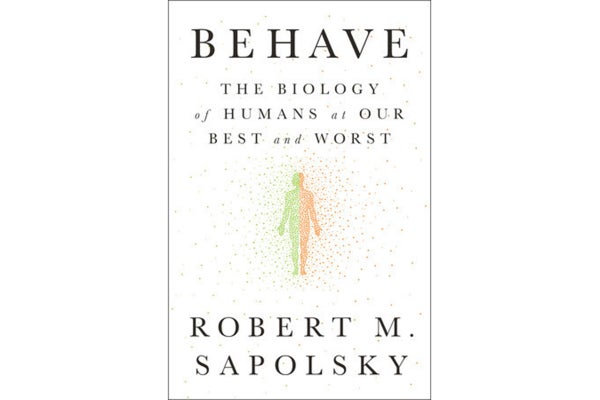This article was published in Scientific American’s former blog network and reflects the views of the author, not necessarily those of Scientific American
When a scientist refuses to acknowledge flaws in the theory that made him famous, things can get ugly. Harvard anthropologist Richard Wrangham, a specialist in chimpanzee behavior, is famous for arguing that war, defined as violence committed by one group against another, is ancient and innate, stemming from an instinct bred into us by natural selection. I call this claim the deep-roots theory of war.
In his influential 1996 book Demonic Males (co-written with a journalist), Wrangham asserts that our warlike ways extend back millions of year to our common ancestor with chimpanzees, who share our predisposition for group aggression.
"Chimpanzee-like violence,” Wrangham writes, “preceded and paved the way for human war, making modern humans the dazed survivors of a continuous, five-million-year habit of lethal aggression." As evidence against this claim has mounted, Wrangham has aggressively defended it, accusing critics of being motivated by wishful thinking rather than science.
On supporting science journalism
If you're enjoying this article, consider supporting our award-winning journalism by subscribing. By purchasing a subscription you are helping to ensure the future of impactful stories about the discoveries and ideas shaping our world today.
He employs this tactic against neurobiologist Robert Sapolsky of Stanford, who for decades has studied baboons in East Africa. Sapolsky is one of our smartest, most eloquent scientific communicators, and he is a potent counterweight to the crude biological determinism that pervades popular accounts of human behavior.
Sapolsky’s new, 790-page book Behave: The Biology of Humans at our Best and Worst is his magnum opus. He delves into what science can tell us about the causes of violence and aggression as well as cooperation and empathy. Although he is a pessimist “by nature,” his research has convinced him that “there is room for optimism” about humanity’s future, and especially the prospects for a more peaceful world.
Wrangham, reviewing Behave in The New York Times, begins on positive note, calling it “a quirky, opinionated and magisterial synthesis of psychology and neurobiology” and “the textbook you will regret never having had in college.” He even praises Sapolsky for cautioning that the links between genes and biology are rarely straightforward.
Then Wrangham strikes. He calls Sapolsky “unbalanced” and a “partisan critic” because he rejects the deep-roots theory of war. Wrangam writes that Sapolsky’s hopes for a better world “flatter to deceive.” Italics added. That charge is outrageous. If anyone is deceiving his audience, it is Wrangham.
Wrangham neglects to mention, as an honest reviewer should, that Sapolsky singles him out for criticism. Referring to the 17th century scholar who described life before civilization as “a war of all against all,” Sapolsky describes Demonic Males as “Hobbes all the way down.” He accuses Wrangham of “cherry-picking” data that supports the deep-roots theory.
Wrangham also implies, deceptively, that Sapolsky’s skepticism toward the deep-roots theory is based on “low rates of violence among contemporary hunter-gatherers.” Actually, Sapolsky carefully sifts through multiple sources of evidence related to war’s origins, including studies of primates and pre-historic hunter-gatherers. The latter data are especially significant, because our ancestors lived as hunter-gatherers until they started settling down and farming.
Sapolsky notes that observations of bonobos, gorillas and other primates contradict the deep-roots thesis. To emphasize the malleability of aggression, he tells the story of a baboon troop that he has tracked since the 1980s, which underwent a dramatic decrease in its aggressive behavior.
He points out that the Yanomamo, an Amazonian tribal people renowned for violence, are not hunter-gatherers, and the correlation between male Yanomamo violence and reproductive success has been overrated. He cites research by anthropologists Douglas Fry, Brian Ferguson and others indicating low rates of violence in humanity’s pre-history. He notes that the oldest clear-cut evidence of group violence is a mass grave no more than 14,000 years old.
Sapolsky concludes: “The HGs [hunter-gatherers] who peopled earth for hundreds of thousands of years were probably no angels, being perfectly capable of murder. However, ‘war’—both in the sense that haunts our modern world and in the stripped-down sense that haunted our ancestors—seems to have been rare until most humans abandoned the nomadic HG lifestyle.”
Why does the debate over the deep-roots theory matter? Because many people, including some in position of power, think that if war is ancient and innate, it must also be inevitable. This proposition was explored by a 2009 RadioLab episode to which Sapolsky, Wrangham and I contributed. For a more recent discussion of this issue, see an article posted on this site last week, “Nasty, Brutish and Short: Are Humans DNA-Wired to Kill?”
Since both that article and the RadioLab broadcast give Wrangham the last word, I’ll grant Sapolsky that honor here. He ends Behave--which is as nuanced as Demonic Males is cartoonishly crude, and which I highly recommend--by summing up his central message: “It’s complicated.”
He adds: “Nothing seems to cause anything; instead everything just modulates something else… Fixing one thing often messes up ten more, as the law of unintended consequences reigns… Eventually it can seem hopeless that you can actually fix something, can make things better. But we have no choice but to try. And if you are reading this, you are probably ideally suited to do so.”
Further Reading:
Was Civilization the Cure for Primordial Human Violence?
Has a Bogus Theory of War Kept Obama from Being a Peace President?
10,000-Year-Old Massacre Does Not Bolster Claim That War Is Innate.
New Study of Foragers Undermines Claim That War Has Deep Evolutionary Roots.
New Study of Prehistoric Skeletons Undermines Claim that War Has Deep Evolutionary Roots.
Survey of Earliest Human Settlements Undermines Claim That War Has Deep Evolutionary Roots.
Chimp Violence Fails to Support Deep-Roots Theory of War.
Margaret Mead’s War Theory Kicks Butt of Neo-Darwinian and Malthusian Models.
RIP Military Historian John Keegan, Who Saw War As Product of Culture Rather than Biology.
